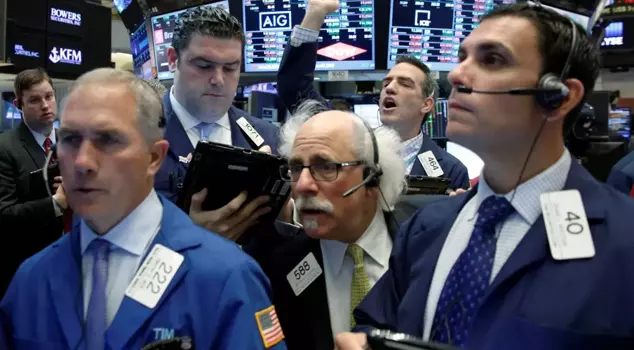
08.04.2025 01:20
The customs tariffs announced by U.S. President Donald Trump caused significant losses in global stock markets. The Hong Kong stock exchange closed the day down 13.2%, at 19,828 points. This is recorded as the largest drop in the country's stock market since 1997.
```html
Due to the customs tariffs imposed by Donald Trump that have had a seismic impact worldwide, the Hang Seng index in Hong Kong fell by 13.2%, the Nikkei 225 index in Japan dropped by 7.7%, the Shanghai Composite Index in China decreased by 7.3%, and the Kospi index in South Korea lost 5.6% of its value.
TRUMP'S CUSTOMS TARIFFS AFFECTING THE WHOLE WORLD
The increasing perception of risk in global markets due to retaliatory measures from the Chinese government against the U.S. customs tariffs is causing sharp sell-offs in world stock markets. U.S. President Donald Trump announced customs tariffs on the country's trading partners on April 2 as part of his "America First" policy. Following the announcement, concerns about possible retaliations from other economies increased, creating selling pressure in the markets by heightening fears that trade wars could deepen.
CREATED A SEISMIC IMPACT IN GLOBAL MARKETS
On Friday, China's retaliatory move further intensified the existing pressure on global equity markets. Meanwhile, news flow suggesting that the European Union would also make a decision in this direction fueled concerns and uncertainties in global markets. The developments raised fears that global economic activity would slow down and that the U.S. would enter a recession, leading to sell-offs in global equity markets.
Analysts noted that China's swift response to the U.S.'s new customs tariffs signaled the beginning of the next trade war, stating, "In addition to a possible resurgence in inflation, market participants are fearful of a global recession."
HISTORIC DECLINE IN HONG KONG STOCK EXCHANGE
On the first trading day of the week, sharp sell-offs were observed in Asian stock markets. While widespread sales were seen in South Korean and Japanese equity markets, the industrial, automotive, mining, and technology sectors led these declines. With these developments, the Nikkei 225 index in Japan closed down 7.7% at 31,187 points, the Kospi index in South Korea fell 5.6% to 2,328 points, the Shanghai Composite Index in China dropped 7.3% to 3,096 points, and the Hang Seng index in Hong Kong closed down 13.2% at 19,828 points. The decline in Hong Kong was recorded as the largest drop since 1997.
The ASX 200 index in Australia fell 4.2% to 7,343 points, while the TPEx 50 index in Taiwan decreased by 2.4% to 266.1 points, the PSEi Composite Index in the Philippines dropped 4.3% to 5,823 points, and the KLCI index in Malaysia closed down 4.1% at 1,443 points. The STI index in Singapore is trading down 7.2% at 3,550 points, and the Sensex index in India is down 3.7% at 72,618 points. The Karachi 100 index in Pakistan is currently down 3.72% at 114,508 points. Markets in Indonesia, Thailand, and Vietnam were closed due to holidays.
SHARPEST DECLINE IN EUROPEAN STOCK MARKETS SINCE THE PANDEMIC
The sharp sell-offs seen in Asian stock markets were also reflected in European markets. With the opening, approximately 97% of the companies listed in the Stoxx 600 in Europe saw their stock prices decline. In Germany, the loss in the DAX 40 index reached 4.7% after the opening, while the CAC 40 index in France fell by 4.9%, the FTSE 100 index in the UK dropped by 3.8%, and the FTSE MIB 30 index in Italy decreased by 5.3%. The SMI Index in Switzerland lost 4.8% of its value. Thus, European stock markets experienced their sharpest decline since the pandemic.
In the U.S., index futures also started the week with a decline. In the futures markets, the Nasdaq index is down 2.2%, the S&P 500 index is down 2.1%, and the Dow Jones index is down 2.3%. Domestically, the BIST 100 index in Borsa Istanbul started the week down 2.80% at 9,117.38 points. The index also lost 2.65% in the first half of the day, falling to 9,131.34 points. Analysts noted that news flow regarding tariffs is at the forefront of investors' agendas, stating that selling pressures in the markets could decrease in the event of possible negotiations.
```